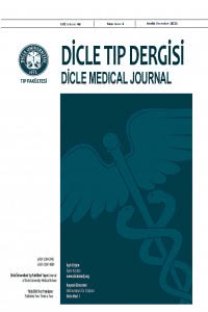Psychological Stress of Healthcare Workers Caused by the COVID-19 Pandemic
COVID-19 Salgınının Neden Olduğu Sağlık Çalışanlarının Psikolojik Stresi
___
1. World Health Organization. Statement on the second meeting of the International Health Regulations (2005) Emergency Committee about the outbreak of novel coronavirus (2019-nCoV), 2020. Available from: https://wwwwhoint/newsroom/ detail/30-01-2020-statement-on-thesecond- meeting-of-the-international-healthregulations-( 2005)-emergency-committeeregarding- the-outbreak-of-novel-coronavirus- (2019-ncov). Accessed on. 17th February 2020.2. Erdoğan A, Hocaoğlu Ç. Psychiatric aspect of infectious diseases and pandemic: A review, Klinik Psikiyatri Dergisi. 2020; 23. DOI: 10.5505/kpd.2020.90277 2020, 23.
3. Enli TF, Koyuncu E, Özel Ş. A review of protective and risk factors affecting psychosocial health of healthcare workers in pandemics. Ankara Med J. 2020; 20: 488-504. DOI: 10.5505/amj.2020.02418.
4. Feng MC, Wu HC, Lin HT, et al. Exploring the stress, psychological distress, and stress-relief strategies of Taiwan nursing staffs facing the global outbreak of COVID-19. Hu Li Za Zhi. 2020; 3: 64-74. DOI: 10.6224 / JN.202006_67 (3) .09.
5. Walton M, Murray E, Christian MD. Mental health care for medical staff and affiliated healthcare workers during the COVID-19 pandemic. Eur Heart J Acute Cardiovasc Care. 2020: 2048872620922795. DOI: 10.1177/2048872620922795.
6. Matsuishi K, Kawazoe A, Imai H, et al. Psychological impact of the pandemic (H1N1) 2009 on general hospital workers in Kobe. Psychiatry Clin Neurosci. 2012; 66: 353-60. DOI: 10.1111/j.1440- 1819.2012.02336.x.
7. Bansal P, Bingemann TA, Greenhawt M, et al. Clinician wellness during the COVID-19 pandemic: extraordinary times and unusual challenges for the allergist/immunologist. Allergy Clin Immunol Pract. 2020; 6: 1781-90.e3. DOI: 10.1016/j.jaip. 2020.04.001.
8. Sohrabi C, Alsafi Z, O’Neill N, et al. World Health Organization declares global emergency: A review of the 2019 novel coronavirus (COVID-19). Int J Surg. 2020; 76: 71-6. DOI: 10.1016 / j.ijsu.2020.02.034.
9. Bohlken J, Schömig F, Lemke MR, et al. COVID-19 pandemic: stress experience of healthcare workers - a short current review. Psychiatr Prax. 2020; 47: 190-7. DOI: 10.1055 / a-1159-5551.
10. Chew NWS, Lee GKH, Tan BYQ, et al. A multinational, multicentre study on the psychological outcomes and associated physical symptoms amongst healthcare workers during COVID-19 Outbreak. Brain Behav Immun. 2020; 20: 30523-7. DOI: 10.1016/j.bbi.2020.04.049.
11. Etxebarria NO, Santamaria MD, Gorrochategui MP, et al. Stress, anxiety, and depression levels in the initial stage of the COVID-19 outbreak in a population sample in the Northern Spain. Cad Saude Publica. 2020; 36: e00054020. DOI: 10.1590 / 0102- 311X00054020.
12. Weiss DS, Marmar CR. The impact of event scale – revised. In: Wilson JP, Keane TM, editors. Assessing psychological trauma and PTSD. New York: Guilford Press; 1997. pp. 399–411.
13. Çorapçıoğlu A, Yargıç İ, Geyran P, et al. Validity and reliability of Turkish version of "Impact of Event Scale-Revised" (IES-R). New Symposium Journal. 2006; 44: 14-22.
14. Lovibond PF, Lovibond SH. The structure of negative emotional states: Comparison of the depression anxiety stress scales (dass) with the beck depression and anxiety inventories. Behav. Res. Ther. 1995; 33: 335-43.
15. Bayram N, Bilgel N. The prevalence and sociodemographic correlations of depression, anxiety and stress among a group of university students. Soc Psychiatry Psychiatr Epidemiol 2008; 43: 667-72. DOI:10.1007/s00127-008-0345-x.
16. Huang JZ, Han MF, Luo TD, et al. Mental health survey of medical staff in a tertiary infectious disease hospital for COVID-19. Zhonghua Lao Dong Wei Sheng Zhi Ye Bing Za Zhi. 2020; 3: 192-5. DOI: 10.3760/cma.j.cn121094-20200219-00063.
17. Chou R, Dana T, Buckley DI, et al. Epidemiology of and risk factors for Coronavirus infection in health care workers. Ann Intern Med. 2020; 5: M20- 1632. DOI: 10.7326 / M20-1632.
18. Lai J, Ma S, Wang Y, et al. Factors associated with mental health outcomes among health care workers exposed to coronavirus disease 2019. JAMA Netw Open. 2020; 3: e20397. DOI: 10.1001/jamanetworkopen.2020.3976.
19. Shah K, Chaudhari G, Kamrai D, et al. How essential is to focus on physician's health and burnout in Coronavirus (COVID-19) pandemic?. Cureus. 2020; 4: e7538. DOI: 10.7759/cureus.7538.
20. Davidson ED, Proudfoot J, Lee K, et al. A longitudinal analysis of nurse suicide in the United States (2005-2016) with recommendations for action. worldviews Evid Based Nurs. 2020; 17: 6-15. doi: 10.1111/wvn.12419.
21. Wang C, Pan R, Wan X. Immediate psychological responses and associated factors during the initial stage of the 2019 Coronavirus Disease (COVID-19) epidemic among the general population in China. Int. J. Environ. Res. Public Health. 2020; 17: 1729. DOI: 10.3390/ijerph17051729.
22. Tay BYQ, Chew NWS, Lee GKH, et al. Psychological impact of the COVID-19 pandemic on health care workers in Singapore. Ann. Intern. Med. 2020; M20-1083. DOI: 10.7326/M20-1083.
- ISSN: 1300-2945
- Yayın Aralığı: Yılda 4 Sayı
- Başlangıç: 1963
- Yayıncı: Cahfer GÜLOĞLU
Evaluation Of Patients With Previous C/S + Plasenta Previa Totalis İn 2017
FATİH MEHMET FINDIK, Mehmet Sait ICEN, Senem Yaman TUNC, Elif AGACAYAK, Mehmet Siddik EVSEN, Ahmet YALINKAYA
Abdulkadir TURGUT, Nurullah PEKER, Elif AGACAYAK, Gamze AKIN EVSEN, Edip AYDIN, Mehmet Sait ICEN, Talip KARACOR, FATİH MEHMET FINDIK, Feyzi CELIK, Emre DIRICAN, Talip GUL
Hemodiyaliz Hastalarında Kateter İlişkili Kan Dolaşım Enfeksiyonlarının Değerlendirilmesi
Enver YUKSEL, Şafak KAYA, Emrah GUNAY
Multipl Skleroz’de Yaşam Kalitesi: Depresif Bulgular Fiziksel Özürlülük Kadar Etkili midir?
Mesrure KÖSEOGLU, R. Gökçen GÖZÜBATIK ÇELİK, Mesude TÜTÜNCÜ, Çelikkol Bahar ERBAŞ
Çocuklarda torakoport yardımlı laparoskopik apendektomi sonuçlarımız
Erol BASUGUY, M.Hanifi OKUR, Serkan ARSLAN, Bahattin AYDOĞDU, Sevinç AKDENİZ, MUSTAFA AZİZOĞLU
MELAS AİLESİ: Klinik - Genetik Korelasyon
Filiz KOÇ, Hürü Rabia GÜLEÇ, Hakan GELİNCİK, ATIL BİŞGİN
Lomber Disk Hernisi Cerrahisinde Uygulanan Farklı Anestezi Yöntemlerinin Karşılaştırılması
Parkinson's Disease Profile – A 17-Year Patient Analysis
Ahmet ADIGUZEL, Unal OZTURK, Sibel ALTINAYAR
Graves Olgularında Kardiyovasküler Hastalık Risk Değerlendirmesi: Trombosit İndekslerinin Rolü
